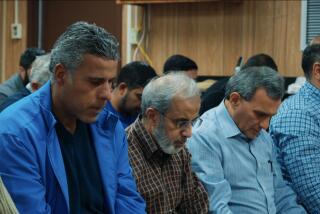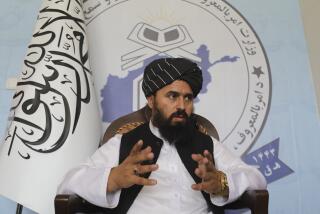A Lifesaving Mission
- Share via
Fauccia Bibi was 16 and lived in Pakistan. Last year, in an incident later chronicled by a BBC documentary, her husband’s family accused her of being unfaithful, threw kerosene on her and set her aflame to defend their honor.
As a group of about 50 people at Cal State Northridge watched the documentary on a recent night, the TV cameras zoomed in on the severe welts and charred flesh of Fauccia’s legs.
“They put a match to me. They burned me,” her voice could be heard saying.
Many cringed in their seats or turned their eyes away. One woman in the crowd found it so hard to bear that she walked out of the room.
This is “honor killing,” and renowned Muslim theologian Riffat Hassan has dedicated herself to denouncing the practice as anti-Islamic.
‘People Are Distorting Islam’
The custom is found in many predominantly Muslim countries where women are murdered by male relatives when suspected of immorality. Accusations of adultery, marrying someone without family approval, being seen with a man who is not her husband, or just being the subject of gossip have been enough to trigger honor killings in traditional societies. The family believes it recovers its honor only when the woman dies. Fauccia, the badly burnt girl in the documentary, died the day after filming.
Some Muslim fundamentalists see honor killings as just punishment recognized by Islam. Others avoid discussion of the subject, fearing that publicity about it will only lead to discrimination against Muslims in Western nations.
Hassan, a Muslim native of Pakistan who is now a professor of religious studies at the University of Louisville in Kentucky, spoke this week at three Southern California campuses. She believes that only widespread publicity will bring an end to the practice.
“The situation is very grim,” she said. “We need a radical revision of how the Koran is interpreted. If we were to construct a society on the true basis of Islam, we would find men and women are equal in the sight of God. So these killings are not happening because they’re following Islam. People are distorting Islam.”
Honor killings became the subject of increased attention in the United States last year after ABC News’ “Nightline” devoted two nights to the subject and rebroadcast the BBC documentary, “Murder in Purdah.” Purdah is the custom of secluding women from society, and among Muslims can require that they be covered completely when in public.
In one segment of the documentary, a father explains how he killed his daughter after she eloped with a man of her own choosing. He walked into the police station and confessed.
“Is it honorable to kill your daughter?” asks the reporter.
“There is no greater honor anywhere,” he says.
Trying to Increase Public Awareness
Hassan appeared as a guest commentator on the second day of the “Nightline” broadcast. Soon after, she said, she received hundreds of letters, phone calls and e-mail messages from Americans and Muslims abroad who had seen the program and wanted to help end the practice, which experts say is most severe in Pakistan.
With that outpouring of support, Hassan founded a nonprofit group, the International Network for the Rights of Female Victims of Violence in Pakistan. Among their goals is to increase awareness about honor killings and raise money to help surviving victims, most of whom are poor and unable to seek medical care.
In the midst of the military coup by Gen. Pervez Musharraf late last year, two international organizations, Human Rights Watch and Amnesty International, published reports on honor killings in Pakistan.
Among the findings, Amnesty International said that “the number of honor killings is on the rise as the perception of what constitutes honor . . . widens.”
The methods of attack vary from hacking the victim to pieces with axes to shooting her. More recently, burning women has become more common. Police almost always take the man’s side in honor killings and rarely prosecute killers, the report said.
To fathers who kill their daughters, and to brothers who burn their sisters, honor is priceless. They believe that women are replaceable but that honor is not.
Hassan says these ideas are rooted in erroneous theological concepts common in traditional Muslim societies. Until the ideas are challenged, discrimination under the guise of Islam will continue, she said.
The challenge for contemporary Muslim theologians, she said, is to analyze and correct misunderstandings of the Koran that have been used against women.
For example, some Muslim theologians and Pakistani judges have employed one verse of the Koran to establish men as the custodians of women. On the basis of custodianship, a man who kills another for defiling the honor of his wife or daughter is deemed to be protecting his property and acting in self-defense.
Hassan, who has analyzed the Koran for 30 years, said a key Arabic word in the verse, qawwamun, is being taken out of context. The word is often translated as “rulers,” but she said it means those who provide support or livelihood.
Hassan interprets the verse not as giving men power over women, but as seeking to ensure that while women are bearing children, they are not responsible for being breadwinners as well.
Generational Divide Seen
While the West focuses on the Islamization of some countries, Hassan said many progressive Muslims are searching for a modern-day Islam. Indeed, across the United States, immigrants from South Asia and the Mideast are devoting more attention to domestic violence. In Los Angeles, a women’s group recently opened a shelter specifically for Muslim women.
“I see a generational divide. The older generation is indifferent. But a lot of young people really feel horrified and embarrassed by this. They have a gut feeling that [honor killing] is not Islam. Yet they don’t have guidance on why,” Hassan said.
Traveling around the country, she is often reminded how much opposition she faces. Last summer she attended a convention of the Assn. of Pakistani Physicians in America, seeking financial assistance for her organization. After her presentation, she said, members of the audience shunned her.
One Pakistani woman said that she had never met a victim of violence and that all the “fuss about honor killings” was unnecessary.
“I was extremely discouraged,” Hassan said. “They were in a state of denial. But I can’t give up on this. In a way, God has brought me to this. It’s the journey of my life.”
More to Read
Sign up for Essential California
The most important California stories and recommendations in your inbox every morning.
You may occasionally receive promotional content from the Los Angeles Times.













